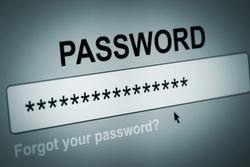How Many Passwords?!
 People who register accounts at a certain site are given unique four-character passwords with which to log-in. Two of the characters of the password are letters ('A', 'B', 'C', etc.) while the other two are numerical digits (0~9). However, the letters and numbers can be in any order. What is the maximum amount of accounts that can be made on the website if repeated characters are allowed in the passwords?
People who register accounts at a certain site are given unique four-character passwords with which to log-in. Two of the characters of the password are letters ('A', 'B', 'C', etc.) while the other two are numerical digits (0~9). However, the letters and numbers can be in any order. What is the maximum amount of accounts that can be made on the website if repeated characters are allowed in the passwords?
The answer is 405600.
This section requires Javascript.
You are seeing this because something didn't load right. We suggest you, (a) try
refreshing the page, (b) enabling javascript if it is disabled on your browser and,
finally, (c)
loading the
non-javascript version of this page
. We're sorry about the hassle.
3 solutions
4!/2!2! is applicable for those cases which r repeating not for everyone.
Wonderful answer....just missed!!!!!!
where I am going wrong ? I did for non repeating characters : - (26 25 10 9) (4!/2!) Plus for repeating characters: - (26 10) (4!/2!2!) Total answer is 703560. Thanks in advance :D :D
Log in to reply
You missed out cases like "letters repeat but numbers do not" and vice versa.
Also, "non repeating characters" should be 2 6 × 2 5 × 1 0 × 9 × ( 4 ! / 2 ! / 2 ! ) .
Took just A,B and C... and got my answer wrong....
What about the case of four unique characters like "AB12"? Are there not (26x25x10x9) x 4! = 1404 000 passwords for this case alone since any order is possible? My total was 1511640 but perhaps I'm over-counting? Thanks in advance.
Log in to reply
There are not 4! cases of AB12. Since it only depends on which places have letters and which have numbers, there are 4! / 2! / 2! = 6 ways.
IE LLNN, LNLN, LNNL, NLLN, NLNL, NNLL.
Why dont we consider uppercase and lowercase letters?
Assume L - letters D - Digits Let us choose 2 positions from the 4 character password, which can be done in "4C2" ways. let us assign "letters" or "digits" to the selected positions, which can be done by either { 26 }^{ 2 } for letters or { 10 }^{ 2 } for digits also the other postions can be filled out by anyone which is not taken into account. Thus, no of ways is 4C2 { 26 }^{ 2 } { 10 }^{ 2 } 405600.
L - letter
D - digit
We can have 26² x 10² different passwords of the form LLDD.
There are 4!/(2! 2!) = 6 variations for the LLDD format.
6 x 26² x 10² = 405600